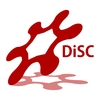Training program
The training program developed by CDSM aims at enhancing the skills and capacities of the students. Most parts of the program regard skills that are independent of the curriculum. On the other hand, the theoretical courses are differentiated by curriculum (SC and SF) and also during the selection of speakers for the seminar cycle it is ensured that both curricula are proportionally represented. It is noted that the large dimension of the Graduate course (the Collegio is the 2nd largest at UNIPD in terms of members) and the presence of both curricula favors a broadening of the cultural horizon of the PhD-students.
Scientific skills
- Each student is obliged to follow 4 theoretical courses of 24 hrs each. A total of 18 courses on the graduate level are offered by CDSM covering all research areas of the school areas of the school. The course are given by members of the Collegio (85 %) and external (international) experts (15%). The courses are differentiated by curriculum (Scienze Chimiche: 12, Scienze Famaceutiche: 6), but students are allowed to select relevant courses from the opposite curriculum.
- The scientific courses are complemented with workshops (typically around 8 hours) held by renowned international experts. Each PhD-student is obliged to accumulate 20 hrs of workshops during the duration of the PhD‐program.
- Seminars are organized on a monthly basis (CDSM Seminar ‐ 10 annual) in which international experts are invited to present the latest developments in the research areas of interest to the CDSM‐community. Speakers are invited both from the SC- and SF-research areas.
Transferable skills
- A successful insertion of the PhD‐students in the job market requires the ability to present themselves and their research and to communicate their work and results.
- To stimulate networking and communication with other scientists from the start, CDSM invests a significant part of the school’s budget to permit students to visit (inter)national conferences also in their first year.
- In collaboration with CLA (Centro Linguistico Ateneo), CDSM offers a 20 hours course in Academic English to the first year students. The highly appreciated course focuses on presentation and writing skills is obligatory – the fees are paid from the CDSM-budget.
- In collaboration with the Chemistry and Pharmacy Libraries, CDSM offers an obligatory 16 hours course on Bibliographic research, open access publishing and data management to the first year students.
- For students in the final year, CDSM offers a practical course in Proposal writing, during which students exercise themselves in proposal writing exploiting a template containing the essential parts of an MSCA-proposal. The process is supervised by experienced members of CDSM (ERC‐grantees and grant-reviewers).
- CDSM offers practical advanced courses on the use of instrumentation (e.g. NMR spectroscopy) to first year PhD-students.
- PhD-students are encouraged to participate in the PhD-educational week, in particular related to the STEP-module dedicated to industrial research aspects organized in collaboration with Confindustria
- Each year CDSM organizes the PhD‐Forum in which the PhD‐students present their research to the scientific community either through oral communications (third year) or poster presentations (first+second year).
- Students are strongly encouraged to perform teaching assistance in the laboratory courses of the Corsi di Laurea e Laurea Magistrale that are offered by DiSC and DSF.
- Students are strongly encouraged to participate in dissemination events, such as Non è Magia, ma Scienza (NEMES), the Researchers’ Night, and the ‘Three Minutes Thesis Competition’.





